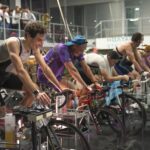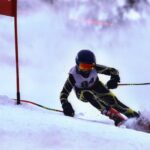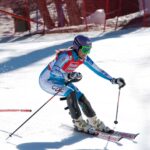There is nothing more important to achieving your sports goals than what you do in training. It is during training that you ingrain the physical, technical, tactical, and mental habits that will come out in competitions. If you establish good habits, you’ll have a good chance of having a good competitive performance. But if you instill bad habits, those will come out and you’ll have no chance of achieving your goals.
Here are my 5 “must dos” that can help you get the most out of your sport training:
- Have a goal and purpose. You must have a clear goal about what area you want to improve as you head out to training. You must also have a clear purpose for training each day. A purpose identifies specifically how you’re going to achieve your goal for the day.
When I’m working with athletes, I will often ask them what their goal and purpose is. If they don’t know, I don’t let them train. I know that sounds harsh, but think of it this way. If you don’t have a clear goal and purpose, you won’t be working on anything to improve. You will not only not be getting better, but you will be making it harder to improve. Let me explain. When you’re not working on something, you are practicing and further ingraining old habits. The more deeply ingrained those old technical, tactical, and mental habits get, the harder it is to change them. So, by not having you train if you don’t have a clear goal or purpose, you may not be improving, but, at least, you’re also not making it harder to improve.
- Train like you compete. When I ask coaches and athletes whether they should train like they compete or compete like they train, the vast majority say compete like you train. Their answer seems reasonable because if you could compete in the same relaxed state as when you train, the chances are you’d perform well.
The problem is that competing like you train is impossible. Why? Because there is a big difference between training and competitions: competitions matter! So I say train like you compete. Think about everything you need to think, feel, and do in a competition and then replicate that in training. By doing so, you will practice and ingrain the skills and habits that you need to perform your best in competitions.
When I say train like you compete, I don’t mean trying to go all out in every aspect of your training. The reality is that there are times in training when you will be focusing on technique or tactics. When I say train like you compete, I mean putting 100% effort, focus, and intensity into whatever you are working on.
Admittedly, you probably won’t be able to train at 100%, but if you can up your efforts from, say, 70% to 90%, when you get to the day of the competition, you’ll have little trouble kicking it up to 100% because your mind and body know that it’s time to compete.
By training like you compete, you won’t need to do anything new or different on the day of the competition. And competitions won’t feel like a big deal because you’ve been at that high level in training. All of those great skills and habits that you instilled in training will naturally come out and you’ll be able to perform your best.
- Use keywords to maintain focus. Perhaps the greatest challenge you face in improving the technical and tactical aspects of your sport is maintaining focus in training. In fact, there are so many things to focus on and so many thing trying to distract you.
As soon as you lose your focus, you lose your ability to work on that thing you were focusing on in training. Here’s a simple rule: If you don’t focus on it, you won’t work on it. If you don’t work on it, you won’t learn it. And if you don’t learn it, you won’t be able to use it in a competition.
The best way I have found to maintain focus in sport training is to develop and repeat a keyword that will remind you to focus on and practice what you are working on to improve. If you’re saying the keyword, you have a much better chance of not being distracted, keeping the focus on the technique you’re working on, actually practicing it, and ingraining it so that it is automatic.
- Make mistakes. One of the most frustrating aspects of developing as an athlete is the mistakes that you make as you work to improve. Yet, athletes often don’t realize that mistakes are an essential part of becoming a better athlete. In fact, many athletes view mistakes as failure; if they didn’t have a perfect performance, they’ve failed. In fact, many athletes I see give up in training at the first hint of trouble. But mistakes only mean failure when you give in to them, don’t learn from them, and keep repeating them.
Mistakes are a natural part of the learning process and offer you valuable information about what you need to work on. Mistakes are actually positive signs in sports because they mean you’re taking risks, moving out of your comfort zone, and working to improve. If you are not making mistakes, you’re just not pushing yourself to be your best.
Rarely has there ever been a perfect performance in sports. The best athletes in the world make mistakes, so if you’re not at that level, you shouldn’t be surprised that you make mistakes too. What makes the world’s best athletes different is not that they don’t make mistakes, but rather how they respond to them. Instead of getting frustrated, angry, and depressed when they make mistakes, the best athletes stay positive and motivated. And, importantly, they learn from their mistakes so they don’t make them again. To ensure that mistakes mean success, immediately after a mistake, identify what exactly you did incorrectly, decide what you need to do to correct it, and focus on the correction in your next performance.
- Have patience, persistence, and perseverance. Two significant barriers to achieving your sports goals are frustration and discouragement. Let’s face it, sports are filled with obstacles, plateaus, and setbacks, and it’s easy to just want to give up. I think it’s especially hard for young athletes these days because all of the messages they get from our sports culture is that success should easy and they shouldn’t have to work that hard to get it. But that’s just not the way the real world works. Gosh, pursuing excellence is just plain difficult. That’s why most people never get there, because they quit when it gets hard.
I read a research study once that said that it takes 2,000 repetitions of a skill to ingrain it fully. The problem is that you can’t just make that many repetitions to really learn something. Rather, you have to have 2,000 quality repetitions, which means you may need to do several thousand more to get to that number. Also, other research shows that those who achieve excellence have put in thousands of hours of practice.
If you’re going to achieve your sports goals, you need the 3 Ps of training. The first P is patience, really understanding that there is no magic and there are no quick and easy paths to success. You must be willing to accept that it will take a long time to reach your goals. The second P is persistence, which means keeping up maximum effort even when you are tired, bored, and wishing you could somewhere else. The third P is perseverance, which involves facing and overcoming those obstacles, plateaus, and setbacks that are an inevitable part of the climb up the steep mountain to your sports goals.
It’s never too late to begin mental training during a competitive season. Take a look at my online mental training courses designed specifically for athletes.






